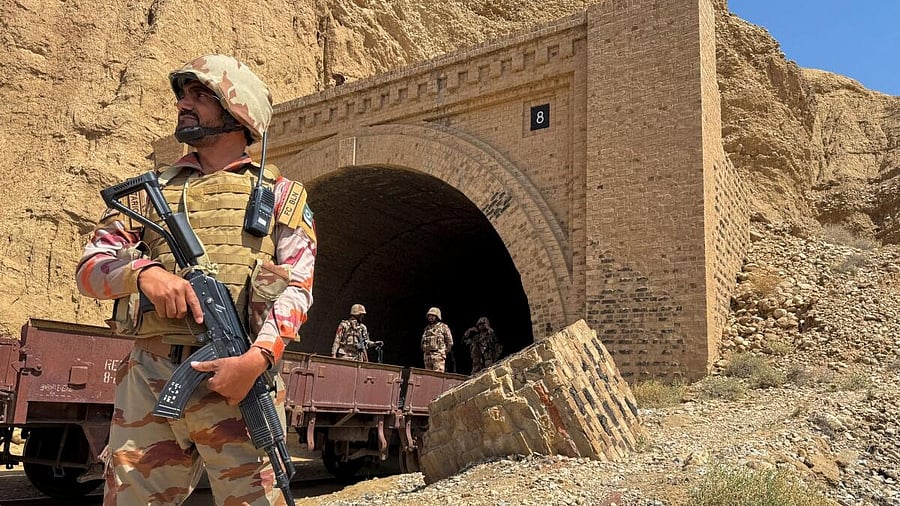
Pakistan army soldiers stand at a tunnel where a train was attacked by separatist militants, in Bolan
Credit: Reuters Photo
The Islamic Republic of Pakistan’s Balochistan problem now seems to have boarded a runaway train with a one-way ticket. The train hijack by the Balochistan Liberation Army (BLA) underscores unbridled audacity.
With multiple civilians and Pakistani soldiers reportedly killed in the attack, the message is clear: the BLA can strike at will, and the repercussions extend far beyond the immediate carnage.
The roots of this crisis extend back to Pakistan’s creation. When the country was carved out of India, a treaty with the Kalat people promised Balochistan independence — a promise that was unceremoniously disregarded when Muhammad Ali Jinnah sent the Pakistan Army to annex the resource-rich province. This historic betrayal not only severed the ties of trust but also laid the groundwork for the current movement for freedom.
Balochistan occupies 40% of Pakistan’s territory, a vast expanse whose loss would unravel the physical fabric of that nation. Its arid, bone-dry terrain is ideal guerrilla ground — a challenge that has forced Pakistan to rethink its security architecture. Beyond the deployment of paramilitary forces and police, the State is now compelled to commit at least two divisions of the army and deploy its air force to counter a foe that grows ever more sophisticated.
The spectre of suicide bombings, like the bombing on March 16 that killed at least five security personnel, only deepens the instability in this occupied land, further tarnishing the reputation of an army already reeling from the psychological damage of losing many of its own in a single, emblematic attack on the Jaffar Express.
The struggle in Balochistan is not merely one of territorial integrity but a contest for control over resources that could reshape the geopolitical landscape. The province is a treasure trove, harbouring over $1 trillion worth of natural wealth. Detailed surveys have revealed deposits of gold, copper, oil, coal, natural gas, black pearl, and other valuable stones. For instance, the Reko Diq project alone is estimated to contain 12.3 million tonnes of copper and 20.9 million ounces of gold.
Amid this struggle, the cultural and civilisational identity of the Baloch people stands as an unyielding bulwark against integration. For Pakistan, it is both an ethnic and national challenge.
For the Baloch, whose civilisation spans 10,000 years, the concept of Pakistan is an alien imposition — a construct that has never been accepted. The sheer neglect and stealing of the economic resources for 75 years has led to this mess, leaving the province teetering on the edge of war.
Pakistan’s approach to Balochistan is akin to driving a speeding train into a headlong collision. Each misstep, each act of State violence or neglect, propels the country closer to an inevitable wreck — one where the infrastructure of national unity and geopolitical stability is shattered beyond repair.
Pakistan will no doubt press on without pity. That will fester the wound. With that terrain and without intelligence on the ground, a country that uses terror as an instrument of State policy suddenly finds a snatched pistol. It’s gazing down the pointed barrel-at the abyss, and the abyss is staring back.
Ninad D Sheth is a senior journalist. X: @ninadsheth.
(Disclaimer: The views expressed above are the author's own. They do not necessarily reflect the views of DH).